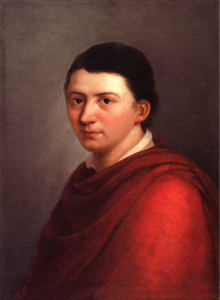Blanka
(Poet's title: Blanka)
Set by Schubert:
D 631
[December 1818]
Wenn mich einsam Lüfte fächeln,
Muss ich lächeln,
Wie ich kindisch tändelnd kose
Mit der Rose.
Wären nicht die neuen Schmerzen,
Möcht ich scherzen;
Könnt’ ich, was ich ahnde, sagen,
Würd ich klagen,
Und euch bange hoffend fragen,
Was verkünden meine Lose?
Tändl’ ich gleich mit Scherz und Rose,
Muss ich lächelnd dennoch klagen.
When I am alone and breezes fan me,
I have to smile,
And similarly I dally about in a childish way and caress
The rose.
If it were not for these new pains,
I might be able to joke;
If I could say what I am aware of,
I would lament,
And hoping anxiously I would ask you:
What do the fates have in store for me?
Even if I dally about with jokes and roses
Behind my smile I still have to lament.
All translations into English that appear on this website, unless otherwise stated, are by Malcolm Wren. You are free to use them on condition that you acknowledge Malcolm Wren as the translator and schubertsong.uk as the source. Unless otherwise stated, the comments and essays that appear after the texts and translations are by Malcolm Wren and are © Copyright.
☙
Themes and images in this text:
Air Being solitary, alone and lonely Children and childhood Fate, luck and lotteries Hope Laments, elegies and mourning Pain Roses and pink Smiling
Blanka must have been one of those unfortunate women gifted with ‘charm’. She finds it impossible to escape from the role imposed on her, perhaps by her looks or perhaps by doting parents who defined her by her feminity and light manner. Like most young women of her time she would have had little control over her future; she would be expected to marry the man chosen for her and to accept the consequences as her duty and calling. The fact that she worries about what her future lot might be suggests that she is cleverer than she appears to those around her. She is perhaps aware of the likelihood of an early death in childbirth or the risk of being infected with a hideous illness by the repellant husband she will eventually be paired off with. Blanka has every reason to lament, but she knows she has to keep smiling.
☙
Original Spelling
Blanka.
Wenn mich einsam Lüfte fächeln,
Muß ich lächeln,
Wie ich kindisch tändelnd kose
Mit der Rose.
Wären nicht die neuen Schmerzen,
Möcht' ich scherzen;
Könnt' ich, was ich ahnde, sagen,
Würd' ich klagen,
Und euch bange hoffend fragen:
Was verkünden meine Loose?
Tändl' ich gleich mit Scherz und Rose,
Muß ich lächelnd dennoch klagen.
Confirmed by Peter Rastl with Schubert’s source, Poetisches Taschenbuch für das Jahr 1806 von Friedrich Schlegel. Berlin. Bei Johann Friedrich Unger. 1806, page 398; with Friedrich Schlegel’s sämmtliche Werke. Erster Band. Gedichte. Berlin, bei Julius Eduard Hitzig, 1809, page 88; and with Friedrich Schlegel’s sämmtliche Werke. Achter Band. Wien, bey Jakob Mayer und Compagnie. 1823, page 204.
Note: Schlegel published the poem in the first edition (1806) with the title Blanka, in subsequent editions he included the poem with the changed title Das Mädchen in his cycle Stimmen der Liebe in the subsection Ansichten.
To see an early edition of the text, go to page 398 Erstes Bild 432 here: https://download.digitale-sammlungen.de/BOOKS/download.pl?id=bsb10119488


